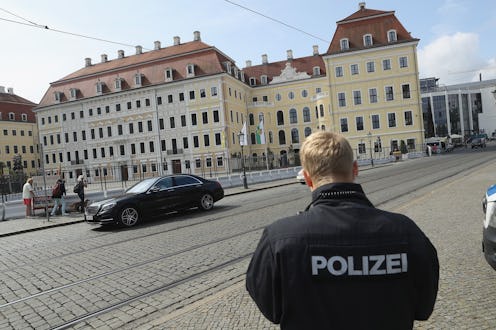News
Germany & The U.S. Have Entirely Different Ways Of Handling People Who Promote Nazi Symbolism

Soon after a group of white nationalists held a violent rally in Charlottesville, Virginia, a supposedly drunk American tourist made a Nazi salute in a pub in Dresden, Germany. These two events, so far from each other in distance but so close in time, are the perfect way to examine the different ways America and Germany handle Nazi salutes.
Of course, the situation in Dresden was far from the chilling protests and counter-protests that rocked Charlottesville, and the whole country, this weekend. In Germany, only one man made a Nazi salute, a 41 year-old American tourist who was “strongly under the influence of alcohol.” His hand motion was quickly met with violence, from a passer-by who saw him display the "Heil Hitler" sign outside of a cafe. German law, of course, treats bodily assault seriously, and the authorities are currently looking for the attacker, who fled the scene after punching the tourist and causing minor injuries.
The man who saluted, however, is also facing legal trouble. Germany banned all Nazi symbolism after World War II, including displays of the infamous Nazi salute — palm facing down, arm held straight out and angled slightly up from shoulder level. As dedicated as Germany is to freedom of speech, people inside the country's borders aren't allowed to make the salute, wear a swastika, or otherwise use any other symbols that the Nazis claim. And this doesn't just apply to Germans themselves — tourists in Germany are also subject to the same laws.
The American tourist, then, is under investigation and could be facing up to three years in prison if convicted of displaying a Nazi symbol, the Washington Post reports. He's more likely to end up with a steep fine, though, which is the punishment that other tourists caught in similar situations have received. For example, two Chinese tourists were recently detained for giving Nazi salutes outside of the Reichstag in Berlin, and each paid 500 euros in bail for their release. In 2011, a Canadian tourist was also arrested and then fined for a similar act.
Even if he doesn't end up with a prison sentence, the American tourist's predicament paints a clear picture of how differently Germany and America handle people who display ties to Nazis. Part of Germany's way of handling its dark history is simply to make such displays illegal. Now, even tourists who may or may not know any better still have to suffer the consequences of their actions. It's also especially meaningful that the American tourist gave the salute in Dresden, a city in eastern Germany where the right-wing has been attempting a resurgence. Despite the prominent right-wing ideology there, it was still met with resistance and then immediately investigated by the authorities. The same can't be said for America.
If the white supremacist rally in Charlottesville had not been so violent, its participants would have been totally free to make whatever salutes they wanted to and chant what they want — even if it's bigoted. Yes, hate speech is illegal in the United States, but it's notoriously difficult to prosecute because of the way American courts determine what is and isn't protected under freedom of speech.
The American president may have been unable to directly condemn the white nationalists who were behind the chaos in Charlottesville — but you can guess how the Dresden police would have reacted.